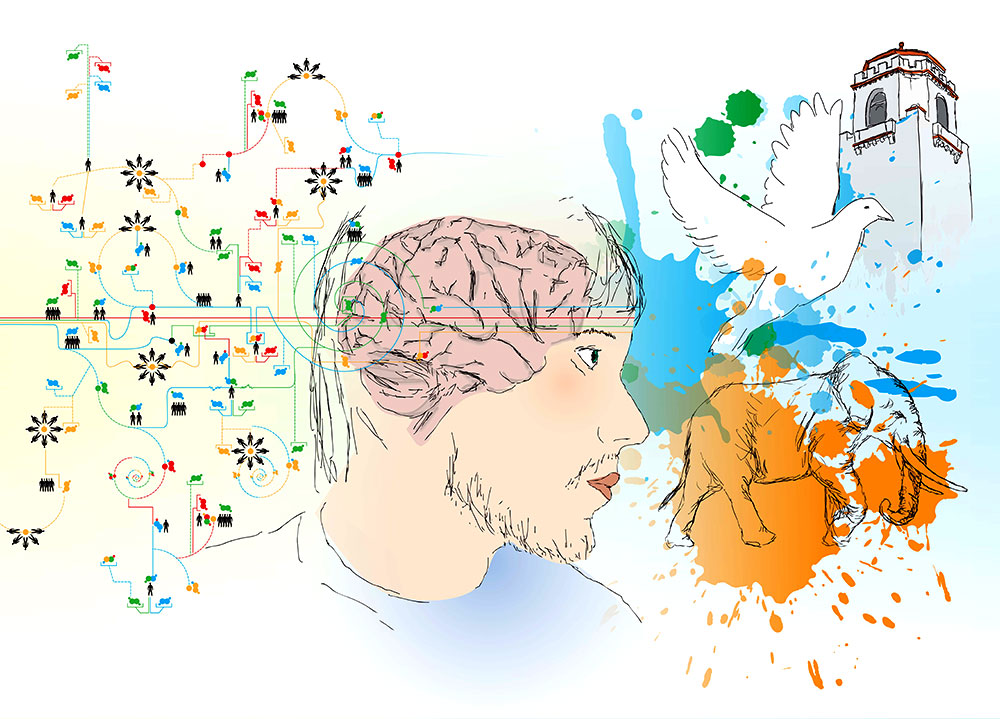‘Musking’ Empathy: The Future Of Leadership Without Emotional Connection?
Yes, you read it right. I am not talking about Masking Empathy, which could occur when people consciously or unconsciously hide their true emotions, but rather ‘Musking’ Empathy if the English dictionary allows me this creative liberty. I would define it as the act of downplaying, rejecting or even reframing empathy as unnecessary, particularly when coming from individuals who may themselves struggle to experience it.
Elon Musk’s recent comments on The Joe Rogan Experience podcast, released on February 28, 2025, provide an interesting case study. Musk suggested that Western civilisation has a fundamental weakness; what he called the “empathy exploit.” He argued that empathy is being weaponised and that society’s emotional reactions are being manipulated in ways that could lead to “civilisational suicide” (CNN, 2025).
Musk’s perspective seems to suggest that empathy-driven policies are harming society by prioritising individual needs over the collective good.
I couldn’t help but wonder… what if Musk’s rejection of conventional empathy is more than just a philosophical stance? What if it’s, in part, a projection of his own neurological or emotional disposition, an attempt to redefine something he may not experience in the same way others do? Rather than dismissing empathy outright, is he reframing it to fit a worldview where emotional connection is secondary to logic and efficiency?
This brings us to an important question: Can the Nordic countries be entirely wrong in their approach to empathy?
Sweden, along with other Nordic nations, has built some of the world’s most economically stable, socially cohesive and innovative societies; all while embracing empathy as a cornerstone of governance. If empathy were truly a “civilisational weakness,” as Musk suggests, how have these nations managed to thrive in global competitiveness, economic growth and societal well-being?
Perhaps the issue isn’t empathy itself but how it is structured and applied. The Nordic model demonstrates that empathy-driven policies don’t have to lead to inefficiency or societal decline; instead, they can strengthen economic resilience, innovation and long-term stability when paired with pragmatic decision-making. A compelling example of this balance that comes to my mind is Finland’s education system. Unlike many Western nations that prioritise standardised testing and competitive learning, Finland has designed an education model centred on equity, well-being and trust. By prioritising holistic development over rigid academic benchmarks, Finland has cultivated a system that fosters creativity, nurtures student potential and supports economic competitiveness.
Could Empathy be a Flaw?
Musk’s argument is not entirely without merit. Emotional reactions, if unchecked, can lead to impulsive decisions, short-term thinking and an inability to prioritise logic over feelings. History has shown that sometimes, the most effective decisions are made by those who can detach from personal emotions and focus on long-term impact.
In high-pressure environments, such as running a large organisation, launching a rocket or making billion-dollar decisions, excessive emotional involvement can slow progress. Musk himself has been described as an extremely high-functioning individual with a relentless focus on efficiency, problem-solving and innovation. His biographer, Walter Isaacson and various former colleagues have noted that he struggles with recognising and responding to the emotional needs of those around him (Isaacson, 2023).
If someone naturally lacks strong empathetic instincts, it would make sense for them to reframe empathy not as a critical leadership skill but as a liability. If you do not feel empathy as strongly as others, the logical response is to view it as an unnecessary distraction or a flaw in societal thinking.
This raises an important question: If someone influential, like Musk, holds this perspective, how much could it shape leadership trends? Could we see a shift toward a model of decision-making that increasingly deprioritises human connection?
Empathy Must Evolve, Not Be Dismissed
For those of us who have witnessed transformational leadership moments where emotional intelligence, including empathy, has profoundly impacted decision-making and team dynamics, this kind of minimisation of empathy feels unsettling.
Neuroscientific research shows that empathy is not just a nice-to-have trait; it is central to human cooperation, team cohesion and effective leadership.
Mariano Sigman, a leading neuroscientist, has explored how conversations literally shape the brain. Meaningful dialogue, which requires empathy, influences neural pathways, helping people refine their perspectives, build trust and make better decisions collectively. When we listen to one another with empathy, our brains synchronise. This biological mechanism is not just about being “nice”. It is about maximising collective intelligence.
Brené Brown, another prominent voice in this space, emphasises that true empathy is not about indulging every emotional reaction but about genuinely understanding and acknowledging another person’s reality. As she puts it, “Empathy fuels connection. Sympathy drives disconnection.” Leaders who lack the ability to connect on this level are at risk of alienating their teams and creating environments where psychological safety and thus innovation deteriorates.
A Call for Balance: Empathy in Leadership
While it is important not to be governed solely by emotions, dismissing empathy altogether is just as dangerous. The key is balance. This means integrating both cognitive empathy (understanding perspectives intellectually) and emotional empathy (feeling and responding appropriately).
We must be mindful not to redefine empathy in a way that strips it of its real meaning. Just because one high-profile leader downplays its importance does not mean that it suddenly becomes irrelevant. In fact, the most effective leaders are those who can bridge the gap between emotional intelligence and forward-thinking strategy.
Instead of rejecting empathy as a weakness, we should be asking:
- How can we ensure that empathy remains a guiding force in decision-making without compromising logic and strategy?
- How do we ensure that the next generation of leaders does not lose sight of human connection in pursuit of efficiency?
The real challenge is not whether we should be empathetic, but how we use empathy wisely. Let’s ensure that ‘empathy’ does not become a buzzword that loses its essence, nor a scapegoat for inefficiency.
Sources:
- Isaacson, W. (2023). Elon Musk. Simon & Schuster.
- Rogan, J. (Host). (2025, February 28). The Joe Rogan Experience [Audio podcast episode]. In The Joe Rogan Experience.
- Sigman, M. (2016). The Secret Life of the Mind. Little, Brown and Company.
- Brown, B. (2018). Dare to Lead. Random House.
- i4 Neuroleader (353)
- Leadership & Culture (336)
- Brain Health & Wellbeing (206)
- Innovation (97)
- Performance (85)
- Our News (79)
- Collaboration (68)
- Agility (53)
- Practitioner Stories (44)
- In The Press (36)
- Make Me A Leader (33)
- Balance (31)
- Integration (30)
- Imagination (29)
- Awareness (23)
- Brain-Friendly Channel (22)
- Brain-Friendly Leadership (22)
- Communication (22)
- Curiosity (21)
- Inspiration (19)
- Intuition (19)
- Attitude (17)
- Courage (16)
- Adaptability (14)
- Case Studies (14)
- Drive (14)
- Generosity (13)
- Ethics (9)
- Mental Readiness (9)
- Influence (8)
- Retreat (8)
- Brain-Friendly Leadership (1)
- Oracle Cards (1)
- 1 November 2025 (2)
- 1 September 2025 (3)
- 1 August 2025 (5)
- 1 July 2025 (5)
- 1 June 2025 (2)
- 1 April 2025 (1)
- 1 March 2025 (8)
- 1 February 2025 (3)
- 1 September 2024 (4)
- 1 July 2024 (2)
- 1 June 2024 (6)
- 1 May 2024 (2)
- 1 April 2024 (3)
- 1 March 2024 (1)
- 1 November 2023 (1)
- 1 August 2023 (1)
- 1 July 2023 (2)
- 1 June 2023 (2)
- 1 May 2023 (4)
- 1 April 2023 (2)
- 1 March 2023 (7)
- 1 February 2023 (4)
- 1 January 2023 (1)
- 1 September 2022 (1)
- 1 May 2022 (3)
- 1 April 2022 (1)
- 1 March 2022 (5)
- 1 February 2022 (4)
- 1 January 2022 (4)
- 1 December 2021 (2)
- 1 November 2021 (4)
- 1 October 2021 (3)
- 1 September 2021 (6)
- 1 August 2021 (1)
- 1 April 2021 (1)
- 1 December 2020 (2)
- 1 November 2020 (1)
- 1 September 2020 (1)
- 1 August 2020 (1)
- 1 July 2020 (3)
- 1 June 2020 (4)
- 1 May 2020 (3)
- 1 April 2020 (4)
- 1 March 2020 (6)
- 1 February 2020 (4)
- 1 January 2020 (2)
- 1 December 2019 (3)
- 1 November 2019 (3)
- 1 October 2019 (5)
- 1 September 2019 (4)
- 1 August 2019 (4)
- 1 July 2019 (4)
- 1 June 2019 (5)
- 1 May 2019 (9)
- 1 April 2019 (9)
- 1 March 2019 (8)
- 1 February 2019 (7)
- 1 January 2019 (8)
- 1 December 2018 (5)
- 1 November 2018 (10)
- 1 October 2018 (16)
- 1 September 2018 (9)
- 1 August 2018 (10)
- 1 July 2018 (9)
- 1 June 2018 (8)
- 1 May 2018 (9)
- 1 April 2018 (9)
- 1 March 2018 (9)
- 1 February 2018 (8)
- 1 January 2018 (8)
- 1 December 2017 (6)
- 1 November 2017 (9)
- 1 October 2017 (9)
- 1 September 2017 (8)
- 1 August 2017 (10)
- 1 July 2017 (8)
- 1 June 2017 (8)
- 1 May 2017 (9)
- 1 April 2017 (8)
- 1 March 2017 (6)
- 1 January 2017 (3)
- 1 December 2016 (4)
- 1 November 2016 (5)
- 1 October 2016 (4)
- 1 September 2016 (2)
- 1 August 2016 (4)
- 1 July 2016 (4)
- 1 June 2016 (2)
- 1 May 2016 (3)
- 1 April 2016 (3)
- 1 March 2016 (7)
- 1 February 2016 (2)
- 1 January 2016 (5)
- 1 December 2015 (2)
- 1 November 2015 (2)
- 1 October 2015 (4)
- 1 September 2015 (2)
- 1 August 2015 (2)
- 1 July 2015 (1)
- 1 June 2015 (3)
- 1 May 2015 (4)
- 1 April 2015 (5)
- 1 March 2015 (3)
- 1 February 2015 (3)
- 1 January 2015 (3)
- 1 December 2014 (3)
- 1 November 2014 (3)
- 1 October 2014 (3)
- 1 September 2014 (5)
- 1 August 2014 (4)
- 1 July 2014 (5)
- 1 June 2014 (3)
- 1 May 2014 (1)
- 1 March 2014 (1)
- 1 December 2013 (2)
- 1 November 2013 (1)
- 1 July 2013 (1)
- 1 June 2013 (1)
- 1 May 2013 (3)
- 1 April 2013 (1)
- 1 March 2013 (2)
- 1 February 2013 (1)
- 1 January 2013 (2)
- 1 November 2012 (1)
- 1 October 2012 (1)
- 1 September 2012 (1)
- 1 August 2012 (2)
- 1 July 2012 (1)
- 1 June 2012 (1)
- 1 May 2012 (2)
- 1 April 2012 (1)
- 1 February 2012 (1)
- 1 January 2012 (1)
- 1 November 2011 (1)
- 1 October 2011 (3)
- 1 September 2011 (2)
- 1 July 2011 (1)
- 1 June 2011 (1)
- 1 May 2011 (1)
- 1 April 2011 (1)
- 1 March 2011 (1)
- 1 February 2011 (2)
- 1 January 2011 (4)
- 1 December 2010 (4)
- 1 November 2010 (3)
- 1 October 2010 (5)
- 1 September 2010 (4)
- 1 August 2010 (4)
- 1 July 2010 (3)
- 1 June 2010 (4)
- 1 May 2010 (7)
- 1 April 2010 (5)
Subscribe by email
You May Also Like
These Related Stories

Working Memory

Communication Skills Are Like A Muscle, They Need Exercise





No Comments Yet
Let us know what you think